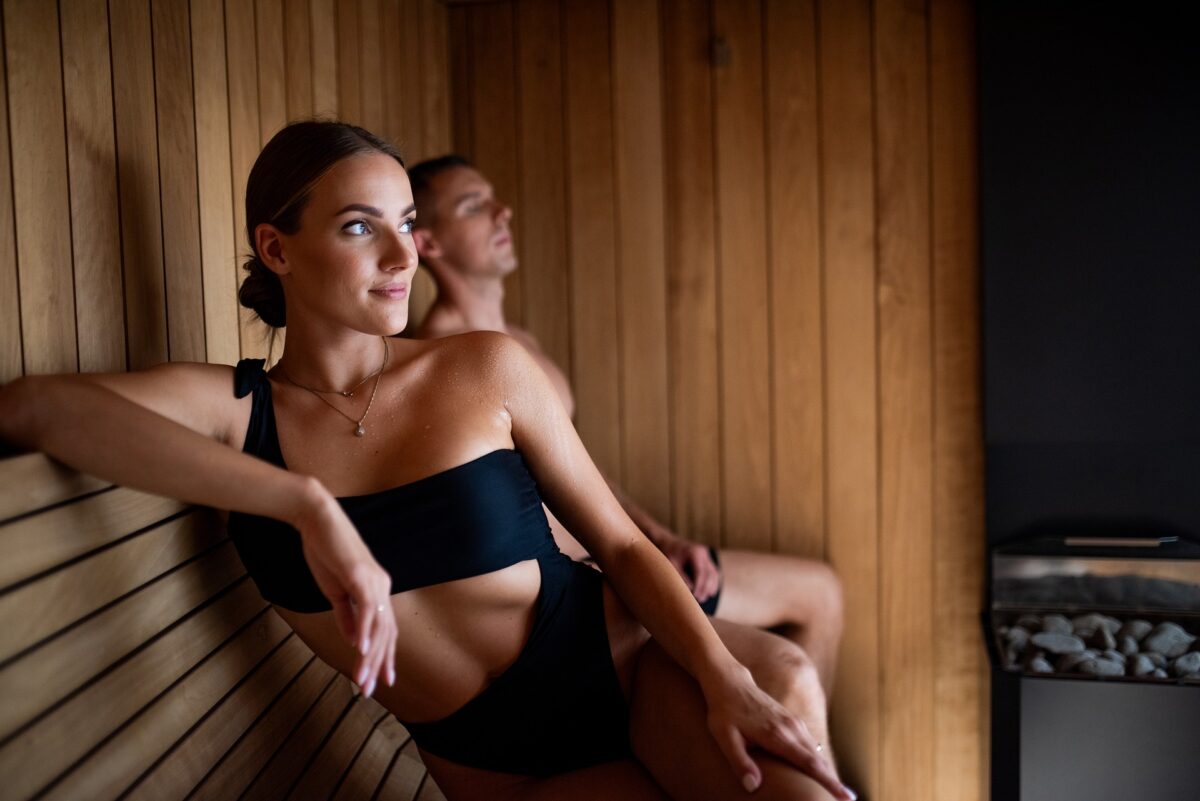Saunas were once considered a luxury reserved for high-end spas and health clubs. They still are to some extent. But they’re now becoming an increasingly common addition to British homes and gardens.
And why not. They’re a place of true relaxation, somewhere you can reset and pack a bunch of health benefits too. But with prices ranging from a few thousand pounds for basic models to £10,000s for premium installations, asking ‘are garden saunas worth it?’ is a good question.
If you’re contemplating building an outdoor sauna, you’re likely weighing up the initial investment against the potential benefits. In this guide, we’ll take a look at the things you need to consider before taking the plunge.
Benefits of having your own outdoor sauna
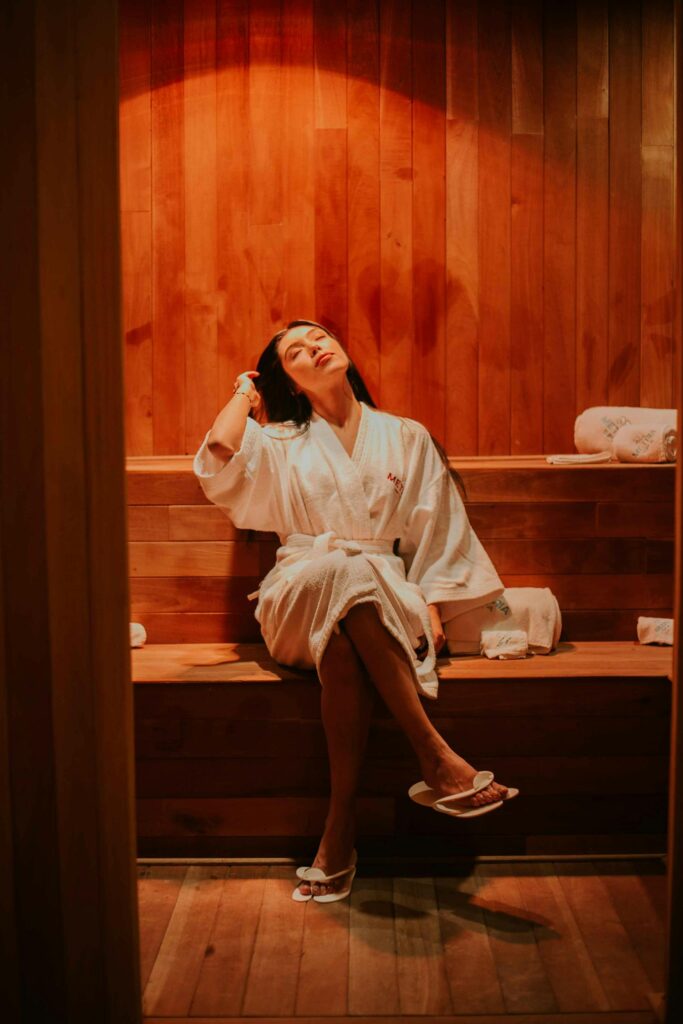
Health and wellness benefits
The health advantages of regular sauna use are backed by plenty of scientific data. It makes them one of the most compelling reasons to invest in a home sauna.
Improved heart health
Heart and circulatory disease (CVD) causes over a quarter of all deaths in the UK. One of the main parts of your body to benefit from regular use is your cardiovascular system.
When exposed to high temperatures (usually between 45°C and 100°C), your heart rate increases. This has a similar effect on your cardiovascular system as moderate exercise.
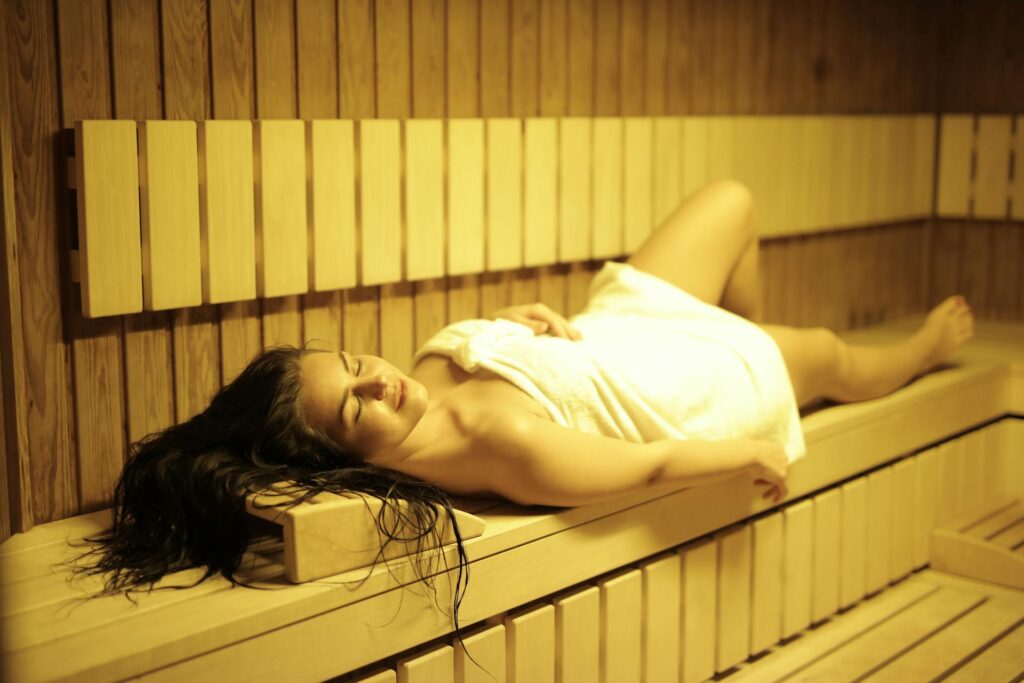
A long-term study in Finland found that men who use saunas frequently have a significantly reduced risk of cardiovascular disease. The research showed that those who use a sauna 4-7 times per week can reduce the likelihood of a CVD-related death by an impressive 50% compared to those who use it less frequently.
Regular sauna use also positively impacts blood pressure. Heat exposure causes blood vessels to relax and dilate, improving blood flow and circulation. Research based on the same Finnish study found that using a sauna for just 15 minutes three times a week for eight weeks lowered blood pressure and improved cholesterol levels more than just exercise alone.
Muscle recovery
The heat from a sauna increases blood flow throughout the body, delivering more oxygen and nutrients to your muscles to fuel their recovery. This makes outdoor saunas particularly valuable for active individuals.
Studies have found that athletes who sit in an infrared sauna for 30 minutes after an endurance workout experience faster recovery and less soreness compared to those who rest in a normal room.

There’s evidence to suggest that regular post-workout sauna use can lead to greater improvements in VO2 max (the maximum amount of oxygen your body can use during exercise) compared to exercise alone.
Reduced inflammation and joint health
Inflammation is a natural response to intense physical activity, but chronic inflammation can harm recovery and lead to joint problems.
Sauna use has been shown to reduce systemic inflammation through the activation of heat shock proteins. Studies have found a significant relationship between sauna frequency and CRP levels, meaning more frequent sauna use results in lower inflammation.
The heat from saunas also helps muscles, joints and connective tissue to relax. This tension-relieving effect can be particularly beneficial for individuals with joint pain or mobility issues, making garden saunas a worthwhile consideration for those with arthritis or similar conditions.
Improved mental well-being
Beyond the physical benefits, saunas can have a profound effect on mental health and stress levels.
Research has found that regular sauna bathing can help lower cortisol levels, the hormone largely responsible for stress. While cortisol is beneficial in low doses, problems arise when levels remain elevated for extended periods.
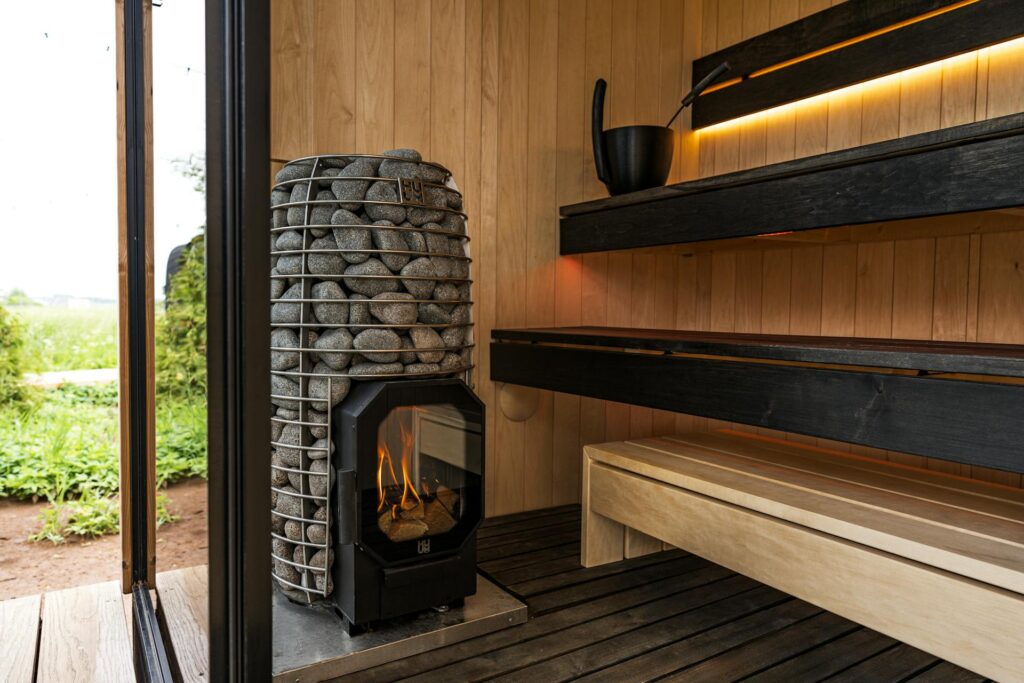
The heat exposure from sauna use can help receptors in the body become more sensitised to beta-endorphins, our natural feel-good hormones. This leads to a heightened sense of well-being and can be a powerful way to relieve stress.
Many sauna users also report improved sleep quality, which has wide-ranging benefits for overall health and cognitive function.
Remember to take the necessary precautions
Yes there are lots of benefits with regular sauna use, but there are some important considerations too.
If you have a pre-existing heart condition or hypertension, sauna use may not be suitable. The increased heart rate and blood flow could place extra strain on your cardiovascular system. Always consult a doctor before use if you have underlying health issues.
Ideal sauna use
- The ideal sauna session lasts 10-20 minutes, giving enough time for your body’s core temperature to rise without going too far
- If you’re new to saunas, start with shorter sessions (5-10 minutes) and gradually work up to longer periods
- Always drink plenty of water before and after using the sauna to avoid dehydration
- Allow time for cooling down and relaxation after your sauna session
Lifestyle Benefits
Beyond the impressive health benefits, home saunas offer significant lifestyle advantages that contribute to their overall value.
Simple year-round wellness at home
Having an outdoor sauna gives you access to spa-like wellness facilities 24/7. It doesn’t matter about the weather either. Even on a cold winter evening, your sauna will be a matter of a few steps away from your back door.
This convenience encourages more regular use, allowing you to maximise the health benefits, easily fit sessions into your schedule and get the most value for your money. No more planning trips to the spa or health club.
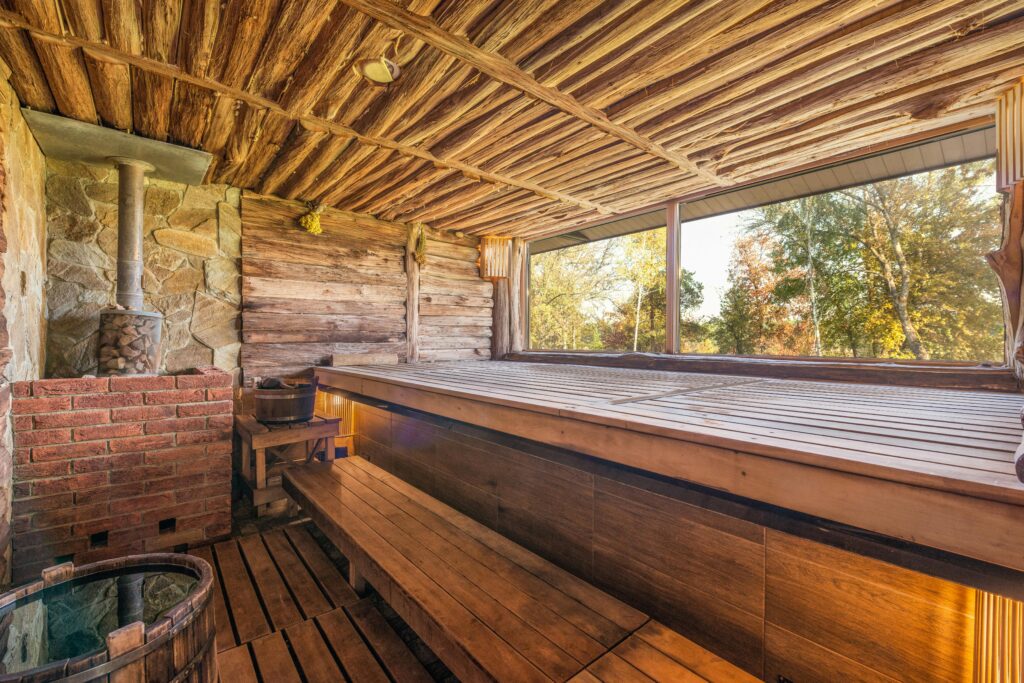
Your own private space
Commercial spas and gyms can offer excellent facilities, but they lack the privacy and personalisation of a garden sauna. Awkward interactions? People talking loudly? Listening to music? A bit on the smelly side? Yeah, there’s none of that with your own personal home sauna.
In your own space, you can adjust the temperature exactly to your preference, play your favourite music and relax completely without the presence of strangers. For many, this privacy and flexibility improves the relaxation experience considerably.
Entertainment value
For many homeowners, an outdoor sauna also adds entertainment value. It becomes a unique feature when hosting friends and family, offering a special experience that most homes don’t provide.

Increased property value
Adding a high-quality outdoor sauna to your property can increase its market value and appeal to potential buyers. Of course this all depends on the location and quality of installation, but they can be a significant selling point. A well-designed, permanent garden sauna room is seen as a premium addition that sets a property apart from others on the market.
It’s thought that a good quality garden room, such as a multi-purpose room and a garden office, can add between 5-15% to the value of your property.
Most estate agents agree that a good quality, insulated garden room will return around 1.5 times the cost of the installation itself.
Types of home saunas
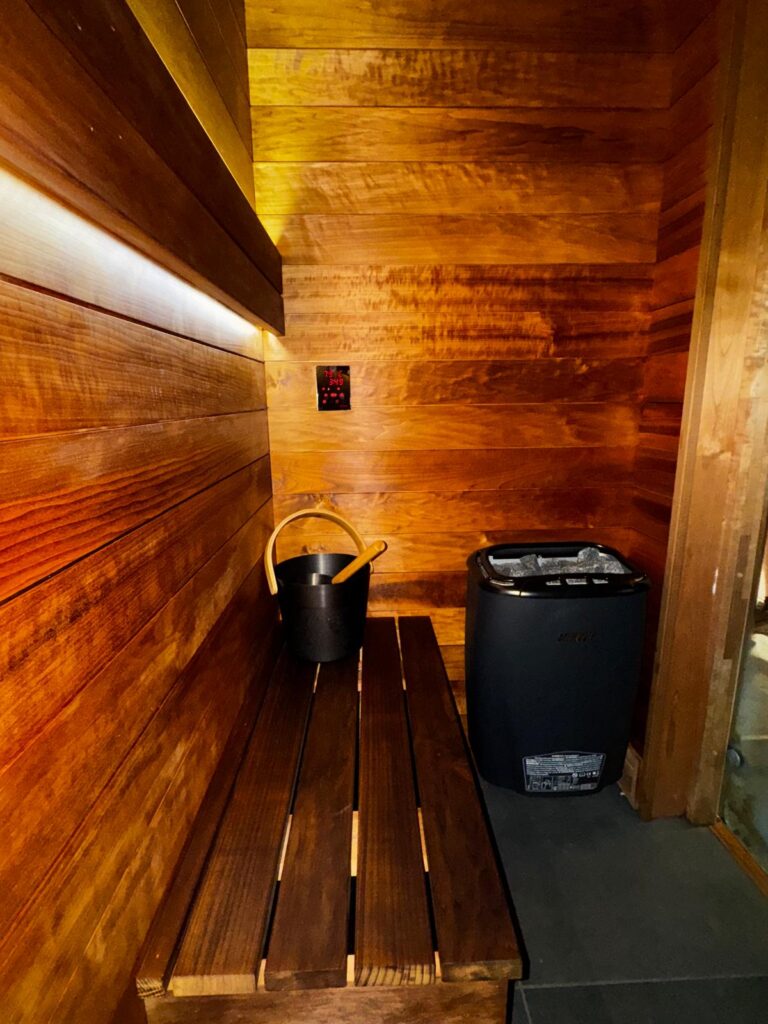
- Wood-burning saunas: Traditional Finnish-style uses wood-fired stoves to heat rocks, creating dry heat at high temperatures. Ideal for outdoor settings with premium materials like cedar and pine. Requires more hands-on involvement and isn’t particularly environmentally friendly due to the smoke produced (you may want to run this by the neighbours) but offers the most authentic experience.
- Electrically heated saunas: Uses electric heaters instead of wood to heat the air to temperatures between 70oC and 90oC. Provides easy temperature control, convenience and low maintenance. Perfect for garden installations with simple on/off operation and no need for tending fires. The image above shows a electric heater that we installed.
- Infrared Saunas: These use infrared light to heat the body directly rather than the air, operating at lower temperatures (between 45°C and 60°C). More energy-efficient, quicker to warm up and gentler for those sensitive to intense heat. According to the International Sauna Association, IR saunas aren’t technically saunas because they don’t heat the air!
- Steam Rooms: Also known as Turkish-style saunas. Provides 100% humidity at lower temperatures. Benefits respiratory conditions but requires additional plumbing and moisture management.
What about an indoor saunas?
It’s possible to install an indoor sauna, but there are a few practical challenges for most UK homes. Installing a sauna inside requires waterproof flooring, very good levels of insulation, proper ventilation systems and moisture barriers to prevent damage to your home. The high humidity and heat can potentially affect surrounding rooms if not properly contained.
Space is another significant consideration – most homes simply don’t have spare rooms that can be dedicated to a sauna installation. Even when space is available, the room requirements for proper clearances and safety considerations can be restrictive.
Garden saunas get rid of these concerns by creating a purpose-built space that’s separate from your main living areas.
What’s the investment for a garden sauna?
The price of an outdoor sauna varies widely based on type, size and quality of the build.
- DIY basic sauna kits start from around £3,000-£5,000 for self-installation. If you want an installer to put it altogether for you, you’ll be talking a few extra £1000s on top of that, probably more than the sauna kit itself.
- Mid-range, installed saunas anywhere from cost £7,000-£15,000
- Premium bespoke sauna rooms with additional features can range from £15,000 to £30,000+
Be aware that many of the cheaper alternatives come with only a couple of years warranty. These are unlikely to be made from quality materials that stand the test of time. This can potentially leave you out of pocket after a few years.

Higher quality options that are properly installed will stand the test of time. For example, all of our garden rooms come with a 10 year building guarantee. Remember, you’ll still have to clean and maintain the inside of the sauna room.
When you break down the cost of a proper sauna room over 10 years, and factor in the property value benefits, it makes even more sense.
Running costs
The operating expenses of a home sauna depend on the type, size, heating method and frequency of use:
- Electric saunas cost somewhere in the region of £1-£2 per hour to run. The exact figure depends on your electricity tariff and the sauna’s size. For example, the 6kW Harvia moderna electric heater shown above will cost around £1.50 per hour to run.
- Wood-burning saunas require fuel, with costs varying based on wood prices and availability. In all likelihood, they’ll cost more to run than an electric sauna.
Long-term value assessment
We’re all about the long term value. A well-constructed timber sauna should last 15-25 years or more with proper maintenance. This makes them a long-term investment rather than a short-term expense.
When considering the value equation of your own outdoor sauna, it’s worth factoring in:
- The physical and mental health benefits
- The convenience of having great wellbeing facilities at home
- The property value increase
- The longevity of a quality installation
Practical considerations before taking the plunge
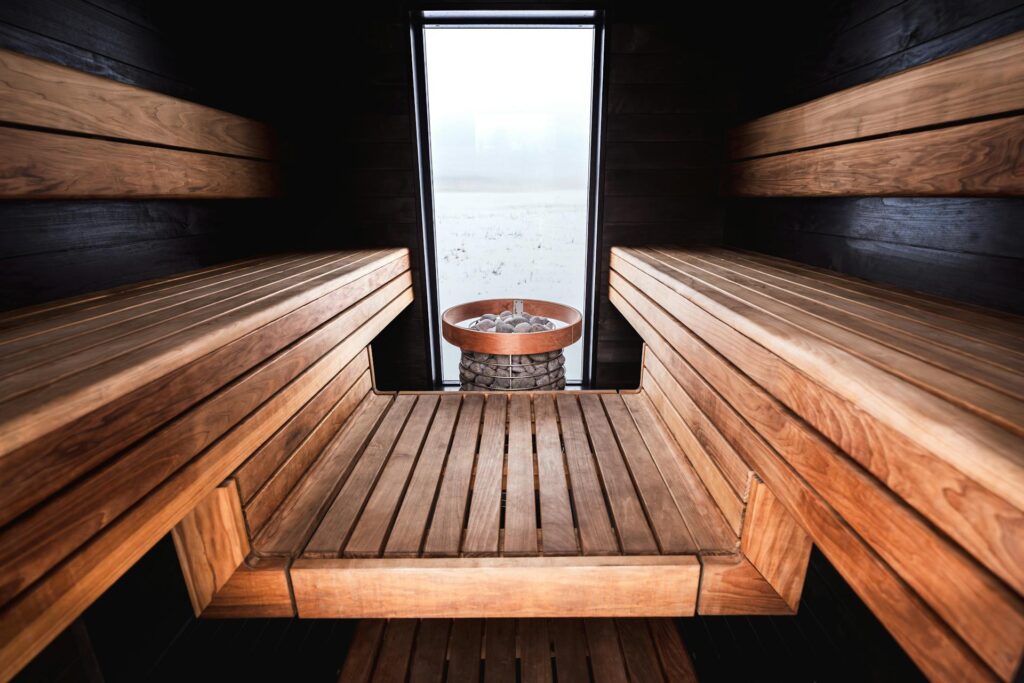
Space and location
You don’t need tonnes of space for a good sauna experience, but you’ll still need to sufficient space in your garden. Here’s a rough guide on requirements:
- A compact 2-3 person sauna might require just 4-6 square metres of space
- Larger family saunas need 6-12 square metres
- Including changing areas, showers or extra relaxation spaces will increase the footprint
The ideal location for a garden sauna should be:
- Away from neighbour views
- Close to your home or with a nice pathway for use in the winter
- Access to electrical connections
- Views and orientation with your garden if possible
- Drainage considerations (not always necessary)
Planning and regulations
In most cases, garden saunas fall under permitted development rights and don’t require planning permission.
This is providing they meet certain criteria in regards to size, height and position. However, there are exceptions for listed buildings, conservation areas and other designated lands.
For a comprehensive understanding of planning requirements, take a look at our guide on garden sauna planning permission.
Building regulations may apply to larger structures or those with complex electrical installations. At Lux Garden Rooms, we handle all necessary permissions and ensure all installations comply with relevant regulations.
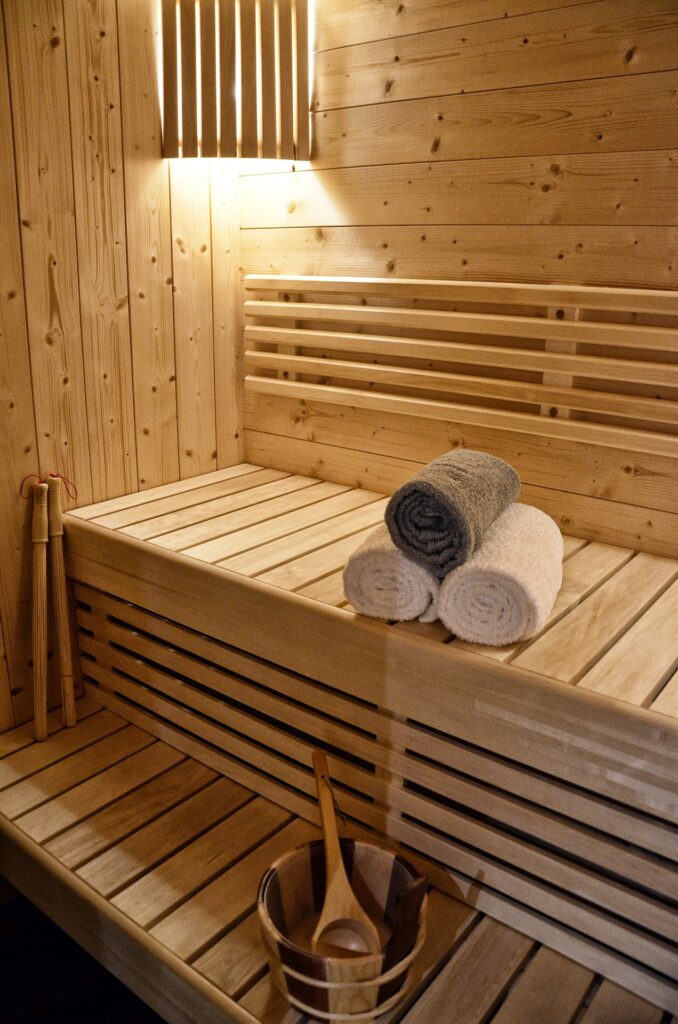
Maintenance and upkeep
Garden saunas do require some maintenance for longevity and optimal performance – they can’t look that good all the time without a little effort!
- Regular cleaning of the interior
- Occasional treatment of wooden surfaces – most often annually
- Checking and maintaining heaters, controls and electrical components
This maintenance isn’t particularly time-consuming, but it’s worth knowing about before you buy one.
So, is an outdoor sauna worth it at home?
All things considered, we think garden saunas are an excellent investment for most UK homeowners who:
- Value health and wellness
- Enjoy relaxation at home
- Have suitable garden space
- Plan to use the facility regularly
The combination of significant health benefits, lifestyle improvements and potential property value increase makes garden saunas a worthwhile investment with both immediate and long-term returns.
The initial costs aren’t small, but when spread over the sauna’s lifetime, we think they offer great value.
At Lux Garden Rooms, we specialise in creating bespoke outdoor sauna rooms that maximise this value through quality construction, efficient design and perfect integration with your outdoor space.
Contact us today to receive a free quote on your plans. Remember, Lux makes it all as easy as possible for you, sorting out everything from the planning and foundations, to the build and final touches.
FAQs
How much does a garden sauna cost?
Garden sauna costs range from approximately £3,000 for basic DIY kits to £15,000+ for luxury bespoke installations with premium features.
What are the health benefits of using a sauna?
Regular sauna use has been scientifically shown to improve cardiovascular health, reduce inflammation, enhance muscle recovery, lower stress hormone levels and potentially reduce the risk of certain diseases. It also promotes relaxation and better sleep quality.
Are garden saunas energy efficient?
Modern garden saunas can be very energy efficient, especially infrared models. Traditional electric saunas cost £1-£2 per hour to run. Proper insulation and quality construction significantly improve efficiency.
Do garden saunas increase property value?
Yes, a well-designed and installed garden sauna can increase your property’s value and appeal to potential buyers. Estate agents often highlight wellness facilities as highly desirable features that can command premium prices.
How often should I use a garden sauna for optimal health benefits?
Research suggests that using a sauna 3-4 times per week provides optimal health benefits. But even just once a week can bring benefits. Sessions of 15-20 minutes at a time are generally recommended, though beginners should start with shorter durations.
What is the difference between a traditional sauna and an infrared sauna?
Traditional saunas heat the air around you to high temperatures (80-100°C), while infrared saunas use infrared lamps to warm your body directly at lower ambient temperatures (around 60°C). Both provide health benefits.

